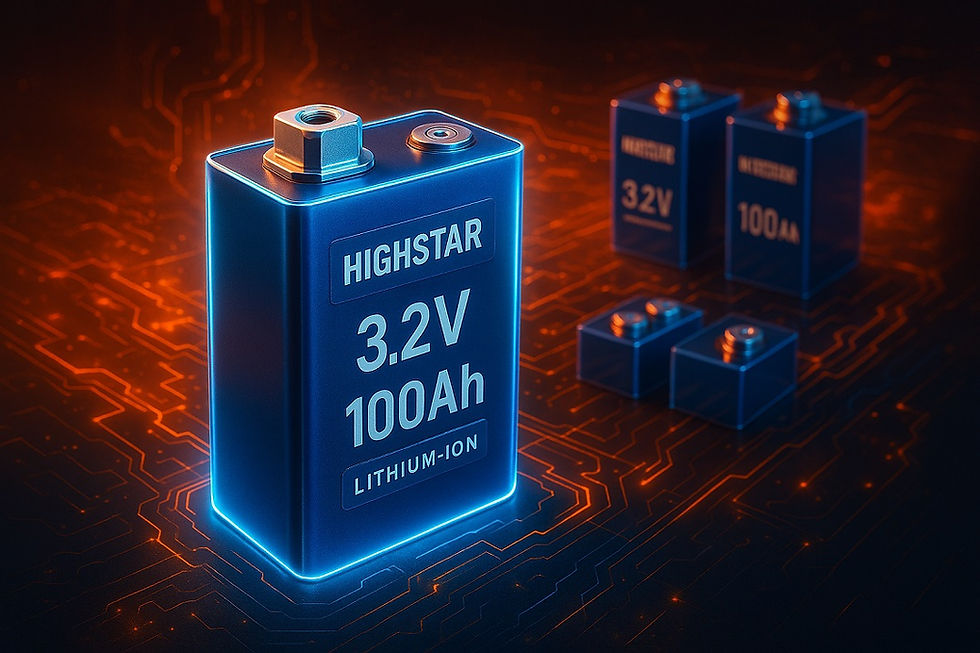Revolutionizing Energy: The Future of Innovations in Lithium Battery Technology
- Miya Roy

- May 17, 2025
- 4 min read

As the world shifts toward sustainable energy solutions, the demand for effective energy storage systems is growing rapidly. Innovations in lithium battery technology lead this change, promising improved efficiency, extended lifespans, and reduced environmental effects. With a bullseye on cleaner energy, the next few years look promising.
The need for dependable energy storage is shaped by several factors. The rise of renewable energy sources, the increasing number of electric vehicles (which saw a 43% jump in sales in 2020 alone), and the demand for grid stability all underscore this growing necessity. In this post, we will explore the latest advancements in lithium battery technology and their impact on the energy storage landscape.
The Importance of Energy Storage
Energy storage is crucial for balancing supply and demand in modern power grids. As renewable energy sources like wind and solar continue to rise in prominence, energy storage systems act as a buffer, capturing excess energy for use when generation decreases. For example, during sunny or windy periods, solar panels or wind turbines produce more energy than is needed, and this surplus can be stored for later use.
Lithium batteries are increasingly favored for their high energy density and efficiency, with costs dropping by over 80% since 2010. These features make them perfect for everything from powering electric vehicles to supporting large-scale grid storage solutions.
Recent Innovations in Lithium Battery Technology
Solid-State Batteries
A significant breakthrough in lithium battery technology is the development of solid-state batteries. In contrast to traditional lithium-ion batteries that use liquid electrolytes, solid-state batteries utilize solid electrolytes, offering several advantages:
Improved Safety: Solid-state batteries pose a lower risk of leaks and thermal runaway, which can lead to fires.
Higher Energy Density: These batteries can store significantly more energy in a smaller volume, potentially increasing the range of electric vehicles by up to 50%.
Longer Lifespan: They tend to show less wear over time, translating to longer life cycles and reduced waste.
Multiple companies, such as Toyota and QuantumScape, are leading the charge in this area, with hopes to bring solid-state batteries to market as early as 2025.
Lithium-Sulfur Batteries
Another exciting area of research focuses on lithium-sulfur (Li-S) batteries. Li-S batteries could outperform conventional lithium-ion batteries when it comes to energy density, theoretically achieving up to five times the energy capacity.
While practical applications have been limited in the past due to cycle life issues, researchers are making strides to address these difficulties. Advances in sulfur cathode design and electrolyte systems are key areas of focus. When these challenges are overcome, Li-S batteries could provide significantly enhanced range and efficiency for electric vehicles, as well as robust energy storage solutions for renewable energy.
Recycling and Sustainability
As the market for lithium batteries continues to expand—with a projected growth rate of over 22% annually—sustainability becomes increasingly important. Recycling methods are evolving to minimize environmental harm and reclaim valuable materials more effectively.
New techniques are being designed to recover lithium, cobalt, and other essential elements from used batteries. Companies like Redwood Materials are pioneering closed-loop systems where materials from old batteries are recycled into new battery production, reducing waste and addressing supply chain concerns.
Implementing these innovative recycling practices will be crucial for the long-term sustainability of lithium battery technology and lessening its environmental impact.
Integration with Renewable Energy Systems
Integrating lithium batteries with renewable energy sources is vital for reaching the full potential of the clean energy shift. By storing energy from solar panels and wind turbines, these batteries ensure a continuous power supply even when these sources aren't producing electricity.
Smart Grids and Energy Management
The rise of smart grid technologies enhances the role of lithium batteries in energy storage. Smart grids provide real-time monitoring and management of energy resources, optimizing the utilization of stored energy during peak demand times.
By employing advanced software solutions and data analytics, these energy management systems can increase overall efficiency. Lithium batteries become essential in building a modern, resilient energy infrastructure.
Challenges Ahead
Despite significant progress in lithium battery technology, numerous challenges remain. Issues such as scalability, cost considerations, and environmental concerns need to be tackled for broader adoption.
The competitive race to innovate battery technology sees various contributors—from established giants like Tesla to nimble startups—each offering unique solutions. As the market evolves, consumers will enjoy increased options, enhanced performance, and decreasing costs.
A Bright Energy Storage Future
The future of energy storage shines brightly, primarily due to advancements in lithium battery technology. Innovations such as solid-state batteries, lithium-sulfur batteries, and enhanced recycling methods push the boundaries of what's achievable.
As we harness technological advancements to craft more efficient energy storage solutions, lithium batteries will become increasingly critical. The combined efforts of researchers, manufacturers, and policymakers will be necessary to navigate current challenges and pave the way for a sustainable energy future.
As society transitions toward cleaner energy, embracing these promising technologies will be vital to meeting future energy needs. Staying informed about these developments allows all stakeholders, from consumers to businesses, to engage actively in shaping the energy landscape of tomorrow.



Comments